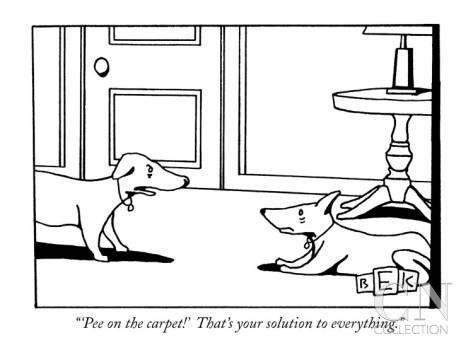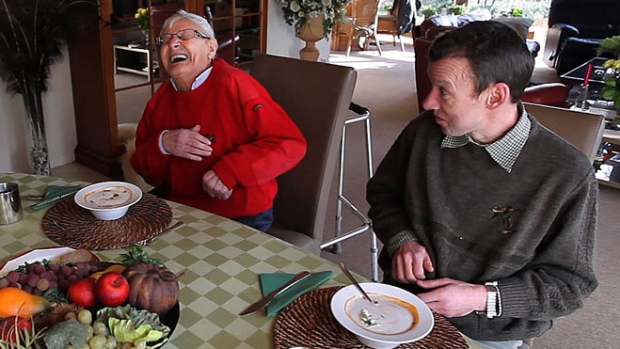
![]() It’s only July, I know, but the Podcast Episode of the Year can already be announced. With all due respect to our own productions, top honors go to Invisibilia’s “The Problem with the Solution”.
It’s only July, I know, but the Podcast Episode of the Year can already be announced. With all due respect to our own productions, top honors go to Invisibilia’s “The Problem with the Solution”.
The cast takes a lengthy look at a place we’ve written about a couple of times before, the town of Geel in Belgium, where instead of being cooped up in a facility mental patients live with local host families, long-term. But that’s only the surface of the program. What hosts Lulu Miller and Alex Spiegel are really doing is painting a portrait of the paradoxical power of acceptance. Namely, that nothing is more potent when it comes to healing troubled souls than ‘blanket acceptance’, but the second it becomes a tool for healing, it ceases to be true acceptance.
In our parlance, you might say that while grace is the only thing that produces truly law-fulfilling behavior in people, if it’s ‘used’ to produce an intended result, it is no longer grace but manipulation (aka a more subtle form of law).
Mid-way through, the researcher they’re profiling, Ellen Baxter, tells the story of her breakthrough. It came when she was interviewing a ‘host mom’ in Geel whose boarder spendt all day twisting the buttons off his shirt. Each night the host mom would sow them back on, so that the boarder could do it again the next day. When Baxters suggests that perhaps she use fishing line as thread–so that the buttons cannot be twisted off–the host mother gets offended. “No, no, you don’t understand”, Baxter paraphrases, that would be the worst thing you could do. Accepting these odd behaviors means not trying to make them go away.

To pragmatic American ears, this sounds absurd. And yet, the patient appears to thrive. The average length of stay with a family in Geel is 28.5 years, and a third of the boarders stay with the same family for over 45 years. Lulu calls this “the strange healing powers of not trying to fix the problem.” She goes on:
The doctors in Geel believe in its power so much that they have dispatched with the thing most sacred to the profession – the idea that there is a problem to fix. When a patient comes to stay with a family in Geel, they are told nothing about the diagnosis.
Doctor: We just want them to share family life with them, share life and do not treat them…
At bottom, what makes the town ‘work’ so well, lies the unthinkable notion that ‘they have let go of the mission to cure’, or as Miller puts it, “the solution to healing a person you love with mental illness was, oddly enough, to not seek a solution.”
As radical as it may sound, I’m pretty sure we know this to be true on an instinctual level. Especially as it relates to love: If I feel that you’re trying to change me, I will resist, or hide. Whereas if I feel loved ‘just as I am’, AKA in my hurt and neurosis and neediness, well, then I find myself wanting to be more pleasant, generous, and easier to deal with (esp vis-a-vis your neurosis and need!). In lieu of “I’ll love you when/if you behave or improve, or simply don’t get worse”, it’s simply “I love you, come what may.” Or even, “you are my son in whom I am well pleased”, before that son has done, well, anything. Acceptance comes first. Love ushers forth from belovedness.

The episode goes one degree further. Miller and Spiegel interview Harvard psychologist Jill Hooley who fills them in on a key caveat of what makes Geel such a special place: the host families are all strangers to the boarders. They are not as invested in the patient’s well-being or recovery to the same extent as blood relatives tend to be (intentionally or not). In fact, as British sociologist George Brown discovered nearly 50 years ago, when the patients return to their own families, the risk of regression is two to three times higher than it would be with strangers. Brown found that the key triggers for ‘relapse’ are criticism, hostility and, trickiest of all, emotional over-involvement. Miller observes:
That yearning, that hope for [the patient] to get better as expressed through tone, that desire to fix the problem, it oozes out of a person, they have found, and works to trigger relapse in the person they’re thinking about… Crazy as it sounds, our private thoughts about a person, our disappointment in them or even our wishes for them to get better, shoot out of us like lasers and can change their very insides.
They go on to list a few of the measurable effects that explicit (and implicit) judgment have on our blood pressure and brain waves. It’s not good. Of course, what pole-vaults the episode into the stratosphere is the closing segment in which Lulu relates the story of her own sister. But I won’t do her the dishonor of trying to paraphrase that part. Listen to it on your next car ride, you won’t be sorry.
So… what have we learned, once again, for the first time? Where all else fails, not only does/can grace heal, but the law kills. This truth is played out in extreme circumstances as well as mundane ones. Cosmic as well as banal. It’s written not just into the fabric of our faith but into the fabric of life–you might even say it is the fabric.
What then for those of us who can’t seem to reign in our critical and emotional faculties when we most need to? Who feel too much, or the ‘wrong’ thing when it comes to those in our lives who are hurting (and we know they pick up on it)? Who spend our days navigating institutions and churches that look a whole lot more American than Belgian?
Well, maybe we have more in common with the patients than the doctors. Not just their maladies but their healing. That is, if there’s any hope to be found, it’s the kind that Larry Trapp encountered in yesterday’s story: the blanket hospitality of a rabbi who not only welcomes the sick and ashamed into his home but makes them his family, buttons or no.
Over to you, Jackie:
https://www.youtube.com/watch?v=nrZUKpcp6GY

COMMENTS
3 responses to “When the Solution Isn’t a Solution”
Leave a Reply













!!!!! This gets five exclamations. Only half way through the year but I think this will be the best post of the year.
Aw shucks. Thanks DB!
[…] Which is admirable, and something we’ve talked about before. The problem here is that, while Hirsh-Pasek is attempting to encourage more creative values, she is nevertheless focused on output. There is an unmistakable (and somewhat expected) element of control at work here. From DZ’s post from yesterday: […]